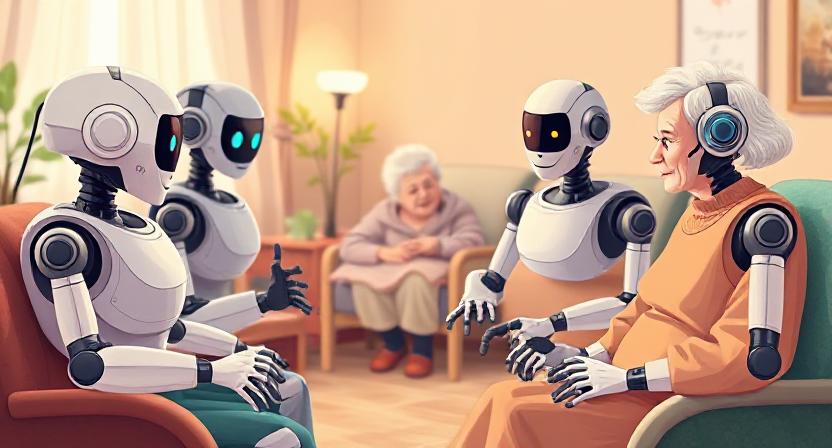AI Agents in Healthcare Genuine Simulation

Empathetic AI in Healthcare Promise Practice and Ethical Challenges Artificial Intelligence AI is rapidly transforming healthcare from diagnostic systems to robotic surgery. But a new...
⏱️ Estimated reading time: 6 min
Latest News
Empathetic AI in Healthcare Promise Practice and Ethical Challenges
Artificial Intelligence AI is rapidly transforming healthcare from diagnostic systems to robotic surgery. But a new frontier is emerging empathetic AI agents. Unlike traditional AI that processes numbers and medical records empathetic AI attempts to understand respond and adapt to human emotions. In hospitals clinics and even virtual consultations these AI systems are being tested to provide not just medical accuracy but also emotional support.
This development raises two important questions Can AI truly be empathetic? And if so what are the ethical implications of giving machines emotional intelligence in healthcare?
What Is Empathetic AI?
Empathetic AI also known as artificial empathy refers to the design of systems that can recognize interpret and respond to human emotions. Notably these systems are especially valuable in sensitive contexts such as healthcare customer service and mental health support where emotional understanding is as important as accuracy.
What Is Empathetic AI?
Empathetic AI refers to AI systems capable of perceiving emotional states and generating responses intended to feel emotionally attuned or comforting. Rather than experiencing emotions themselves these systems use patterns and cues to simulate empathy.
How Empathetic AI Detects Emotions
- Natural Language Processing NLP: Analyzes text and speech for sentiment tone and emotional nuance. Helps AI detect frustration anxiety or positivity.
- Computer Vision for Facial Expressions: Uses AI to detect micro-expressions and facial cues e.g. smiles frowns to gauge emotions.TechInnoAI
- Voice Tone and Speech Analysis: Monitors pitch speed volume and tonality to assess emotional states like stress or calmness.
- Multimodal Emotion Recognition: Integrates multiple data streams facial vocal textual and sometimes physiological to build richer emotional models.
Real-World Applications
- AI Therapists & Mental Health Bots: Tools like Woebot use NLP to detect signs of depression or anxiety offering empathy-based feedback and resources.
- Emotion-Aware Telemedicine: Platforms like Babylon Health may provide practitioners with real-time insight into patient emotions during virtual consultations.
- Robot Companions in Elder Care: Empathetic robots like Ryan that integrate speech and facial recognition have shown to be more engaging and mood-lifting for older adults.
In Customer Experience:
- Virtual Assistants and Chatbots: Systems can detect frustration or satisfaction and adapt tone or responses accordingly.
- Emotion-Sensitive Call Center Solutions: AI systems help de-escalate customer emotions by detecting stress in voice and responding attentively.
Cutting-Edge Innovations:
- Neurologyca’s Kopernica: A system analyzing 3D facial data vocal cues and personality models across hundreds of data points to detect emotions like stress and anxiety locally on a device.
- Empathetic Conversational Agents: Research shows that AI agents interpreting neural and physiological signals can create more emotionally engaging interactions.
Strengths & Limitations
- Offers 24/7 emotionally aware interaction
- Supports accessibility especially in underserved regions
- Helps burnished professionals reclaim patient-centered care time
- Adds emotional dimension to virtual services improving engagement
Limitations & Ethical Concerns
Authentic human connection remains irreplaceable
May misinterpret emotional cues across cultures or biases in training data
Risks manipulation or over-reliance especially in sensitive areas like therapy
For example, an empathetic AI chatbot might:
- Offer calming responses if it detects distress in a patient’s voice.
- Suggest taking a break if a user shows signs of frustration during a therapy session.
- Adjust its communication style depending on whether a patient is anxious confused or hopeful.
Unlike purely clinical AI empathetic AI seeks to provide human-like interactions that comfort patients especially in areas such as mental health eldercare and long-term chronic disease management.
Mental Health Therapy
AI-powered chatbots such as Woebot and Wysa already provide mental health support by engaging in therapeutic conversations. These tools are being trained to recognize signs of depression anxiety or suicidal thoughts. With empathetic algorithms they respond in supportive tones and encourage users to seek professional help when necessary.

Elderly Care Companions
Robotic companions equipped with AI are now being tested in nursing homes. These systems remind elderly patients to take medication encourage physical activity and offer empathetic conversation that reduces loneliness. Moreover for patients with dementia AI agents adapt their tone and responses to minimize confusion and agitation.
Patient-Doctor Interactions
Hospitals are experimenting with AI that sits in on consultations analyzing patient emotions in real time. If the system detects hesitation confusion or sadness it alerts doctors to address emotional barriers that might affect treatment adherence.
Virtual Nursing Assistants
AI assistants in mobile health apps provide round-the-clock support for patients with chronic diseases. They use empathetic responses to reassure patients, reducing stress and improving adherence to treatment plans.
Benefits of Empathetic AI in Healthcare
The potential advantages of empathetic AI are significant:
- Improved Patient Experience: Patients feel heard and understood not just clinically examined.
- Better Mental Health Support: Continuous monitoring of emotional well-being helps detect issues earlier.
- Reduced Loneliness in Elderly Care: AI companions provide comfort in environments where human resources are limited.
- Enhanced Communication: Doctors gain insight into patients emotions enabling more personalized care.
- Accessible Support: Patients can engage with empathetic AI anytime beyond clinic hours ensuring 24/7 emotional assistance.
Notably empathetic AI may serve as a bridge between technology and humanity creating healthcare systems that are not only smart but also emotionally supportive.
Ethical Concerns of Empathetic AI
While empathetic AI offers hope it also raises serious ethical challenges.
Authenticity of Empathy
AI does not feel emotions it simulates them. This creates a philosophical and ethical dilemma Is simulated empathy enough? Patients may find comfort but critics argue it risks creating false emotional bonds with machines.
Data Privacy
Empathetic AI relies on highly sensitive data including voice tone facial expressions and behavioral patterns. Collecting and storing such personal data raises serious privacy risks. Who owns this emotional data? And how is it protected from misuse?
Dependence on Machines
If patients rely heavily on AI for emotional comfort they may reduce engagement with human caregivers. This could weaken genuine human relationships particularly in mental health and eldercare.
Algorithmic Bias
Empathetic AI must be trained on diverse populations to avoid misinterpretation of emotions. A system trained primarily on Western facial expressions for example may misread emotions of patients from other cultural backgrounds. Such biases could result in misdiagnoses or inappropriate responses.
Informed Consent
Patients may not fully understand that an AI agent is not genuinely empathetic but only mimicking empathy. This raises concerns about transparency and informed consent especially when AI is used in vulnerable patient groups.
Balancing Promise and Ethics
- Transparency: Patients must clearly understand that AI agents simulate empathy not feel it.
- Privacy Protection: Strong encryption and strict data governance policies are essential.
- Human Oversight: AI should support not replace human caregivers. A human-in-the-loop approach ensures accountability.
- Bias Audits: Regular testing should ensure empathetic AI systems perform fairly across different populations.
- Emotional Safety Guidelines: Healthcare providers should set limits on how AI engages emotionally to prevent patient dependency.
Case Studies in Practice
- Japan’s Elderly Care Robots: Companion robots like Paro a robotic seal reduce loneliness but spark ethical debates about replacing human interaction.
- AI Mental Health Apps in the US: Platforms like Woebot show positive results in reducing anxiety but questions remain about long-term dependency.
- Hospitals in Europe: Pilot projects use empathetic AI to monitor emotional states during consultations, yet doctors warn about over-reliance on algorithms.
These real-world tests highlight both the promise and pitfalls of empathetic AI in healthcare.
Related Posts

Waymo Faces Criticism After Cat’s Tragic Death
Beloved SF Cat’s Death Fuels Waymo Criticism The recent death of a beloved San Francisco...
November 17, 2025

Tim Chen The Sought-After Solo Investor
Tim Chen A Quiet Force in Solo Investing Tim Chen has emerged as one of...
September 23, 2025

Tide Achieves Unicorn Status with India’s SMB Support
UK Fintech Tide Becomes Unicorn with TPG’s Backing UK-based fintech company, Tide, has achieved unicorn...
September 22, 2025










Leave a Reply